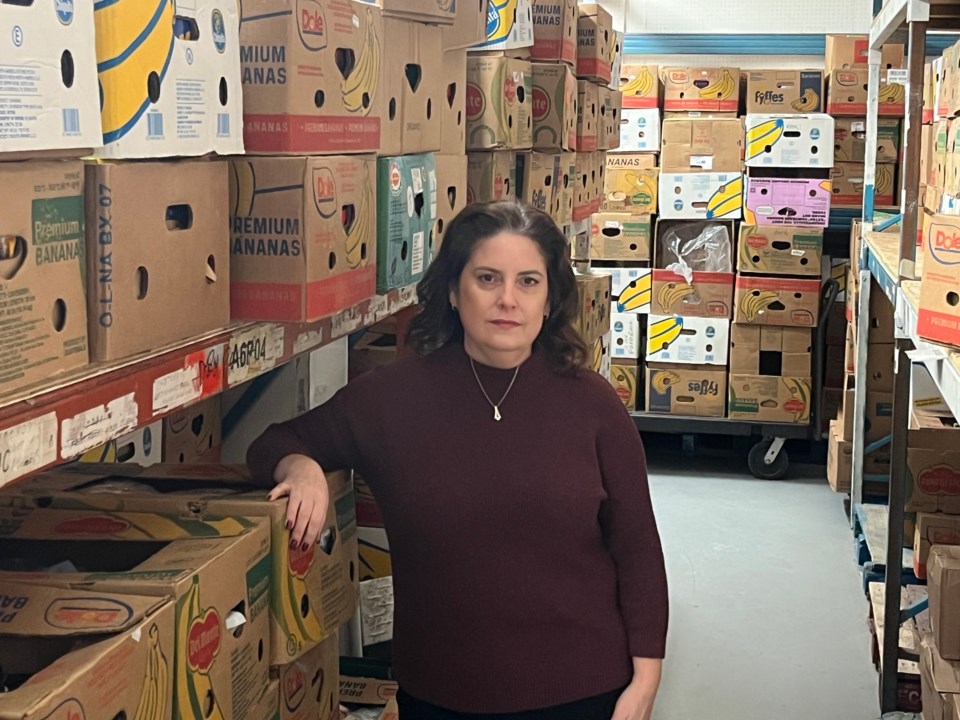As the need for its services continues to increase, the physical space inside the Cambridge Food Bank is getting tight.
And while the $1.5 million in funding being given to the Food Bank of Waterloo Region as part of the 2024 regional budget will help with the former, the latter remains unsolved.
Of that money, which was increased this year from $744,000, the Cambridge Food Bank is set to receive 21 per cent with the majority helping them simply keep their shelves full.
"The funds are used to buy more food for emergency assistance and our community pantry program," Dianne McLeod, executive director of the Cambridge Food Bank said.
"It’s hard to describe unless you're here, it feels like we're constantly stocking shelves."
McLeod said as fast as the food comes in, it's going out. A notion that's backed by 2023 statistics.
McLeod's team served 10,000 individuals a total of 43,000 times in the past year, a 39 per cent increase over 2022. Of those totals, 34 per cent were children.
The Food Bank of Waterloo Region and the Cambridge Food Bank guide the Community Food Assistance Network, a system of over 120 community programs and agency partners that provide food to those in need, including soup kitchens, shelters and food hamper programs.
The motion to increase the funding was put forth by councillor Rob Deutschmann at the Strategic Plan and Budget Committee meeting on Dec. 13. After which, fellow councillor and chair of the meeting Mike Harris commented during the discussion about bringing the service to a single location.
"When I had a tour of the food bank, there was discussions of facilities for a Waterloo Region Food Bank growing at the seams and a need for more space," Harris said.
"We now know the Cambridge Food Bank is likely in a similar situation. If there is a future ask for capital or facilities, it would be at least my expectation that you're working together to figure that potential solution out," he said.
"I'm a Kitchener guy and I don't care where the facility is in the region, as long as it serves the most amount of people as possible. More facilities isn't always better."
It was a comment McLeod said she didn't understand and was hoping to get clarification on.
"I’m not sure what was meant by centralization. A central warehouse? Or a central facility where people go?" McLeod said.
"With a region this size, we couldn’t expect people to go to one food bank. It would be many hours on a bus. We wouldn't expect low income people to travel across the region to get food. If he meant having one big warehouse, that does make sense."
CambridgeToday reached out to Harris in hopes of clarifying the statement but he didn't immediately respond to our request.
Regardless of where future discussion go, McLeod emphasized a facility is staying in Cambridge and needs to be on a bus route.
When the food bank first moved into its location on Ainslie Street, which measures approximately 16,000 square feet, it was giving out 200,000 pounds per year.
That number has since skyrocketed to over one million pounds of food, under the same roof with minimal space upgrades.
McLeod believes a 40,000 square foot home is now needed in order to handle the flow of food and bring wraparound services into one location.
"We have to have our own food on site," she said.
"The Cambridge Food Bank has been a service hub and we want to be able to expand those offerings, have a space where other agencies are co-located with us, other services that people might need such as a low cost counselling, job search and family outreach programs. We know people who use one social service often use another."
But for now, it all remains up in the air with 16 full-time staff and over 300 volunteers making the best of what they have.
"I wish I had more of an update," McLeod said.
"We're continuing to look for properties and we're going to be flexible. It's hard to come by in Cambridge."



